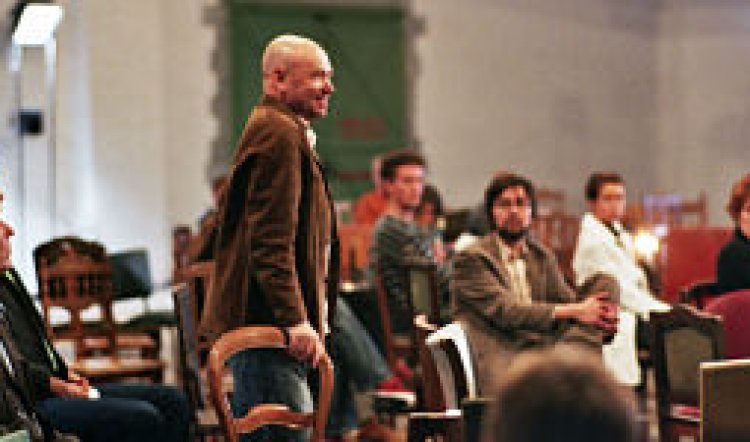
SYDNEY FESTIVAL - RUHE
RUHE Muziektheater Transparant, The Great Hall, Sydney University, January 25-29, 2010
ABSENCE of sound, silence, quiet – ruhe – can be interpreted in many ways. Silence may be benevolent, it may also be malevolent: being silent in the face of wrongdoing or cruelty, for instance. Silence can also be revealing: I recalled the sweet, soft quiet of a spring morning in rural Germany, sun shining, green meadows lush and benign, somewhere nearby a dog barks and chimes mark the hour, they somehow enhance the experience of profound quiet. The small everyday sounds are from Bergen, the village visible from the memorial ruins of the Belsen death camp. The rest is silence as realization dawns that the people of Bergen must have known, could hardly have “not known”, of what went on at Belsen during WW2. Banal or profound thought: the worst of human experience can be both
Reveries of all kinds are part of the experience of Ruhe, the music-theatre event devised by Josse de Pauw with Collegium Vocale Gent and Muziektheater Transparant. Probably more so if you’re not a German speaker and therefore the exquisite voices harmonising in the Schubert lieder are more aural meditation than text. In the setting of the Great Hall, with its stained glass and vaulted roof, the musical component is at once soothing and uplifting. It’s also unexpected – because each singer rises singly from among an audience that is seated on a motley grouping of old chairs, like attendees at some kind of village meeting.
The two actors who deliver the verbatim theatre component of the piece are also seated in the audience, so it’s almost as if the beauty and serenity of Schubert’s music is too much for them. One after the other they get to their feet and tell of their wartime experiences – as Dutch members of the SS. To us they are collaborators, but in their own minds and stories, they were doing the right and reasonable thing, for a variety of reasons.
Are they sorry and conscience-stricken? No, that would be false and foolish from their point of view. They were nationalists, anti-communists and the young woman who met Himmler and the Fuhrer as part of her work thought they were nice and probably misunderstood. Her earnestly-told story is logical and credible and, therefore, all the more haunting: there but for the grace of Something-or-other go I.
The first performance of Ruhe was somewhat marred by sound problems around the sussurating vocal quality of Truus te Selle as the eager SS nurse. Her delivery periodically got lost in the criss-cross placement of the speakers in the hall, but apparently this was fixed for later shows.
-c750x442.jpg)
The second speaker is a belligerent nationalist – Han Kerckhoffs – and a more easily identifiable villain. He takes great trouble to explain that he has nothing against Jews, then goes on to demonstrate a deep and classic anti-Semitic worldview. Nevertheless, he is an ordinary man and could be any next-door neighbour on any street, until he has a couple of beers beside the barbie, perhaps, and starts telling you what he really thinks.
People I’ve spoken to expressed some disappointment at not hearing more of the verbatim recollections from other sources/actors, and it did feel slightly disjointed – a recital interrupted by a couple of disturbed patrons, perhaps. On the other hand, to give greater weight to the reminiscences could have tipped the balance towards bathos rather than the electrifying combination of sublime German music and the painfully commonplace interjections of the Dutch collaborators.
Ruhe ends with the singers retreating to the stage at the rear of the Hall to perform a contemporary piece by Dutch composer, Annelies van Parys. It is meditative, hypnotic and reassuring or, depending how you react to the SS stories, simply melancholic; but either way, it is beautiful and demonstrates why Collegium Vocale Gent is so highly regarded. They sing beneath a blown-up black and white photograph – projected onto a large screen – that depicts European countryside, probably at the time of WW2. In the middle distance a couple of workers observe the camera, fields lie fallow or uncropped and peaceful; a barn is the only sign of human endeavour while an enormous old oak tree is the focus of the image. And its leaves move as if blown gently by an unheard breeze. It’s a little bit of technical magic that is somehow the most affecting moment of the 90 minutes: ruhe.



